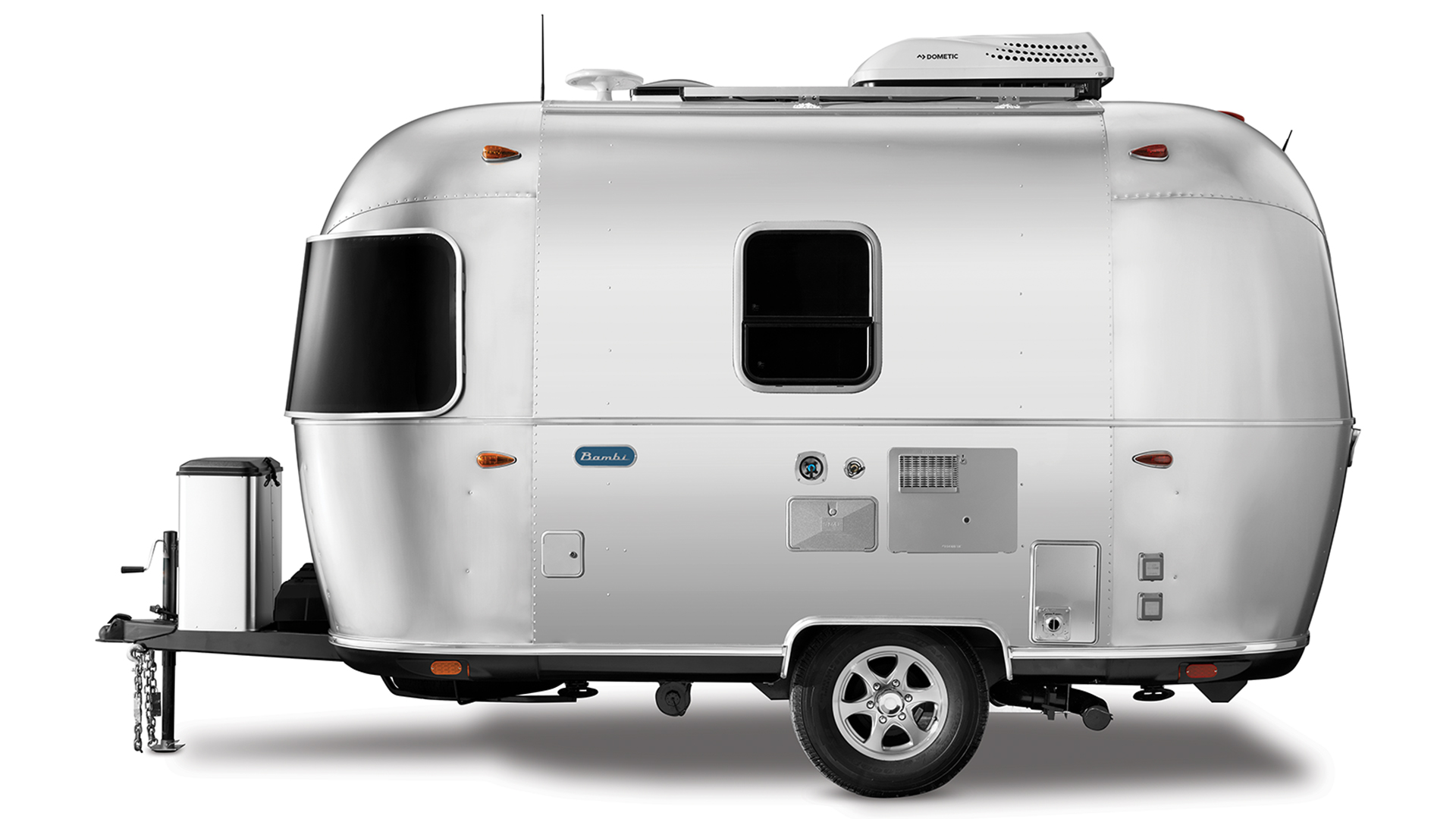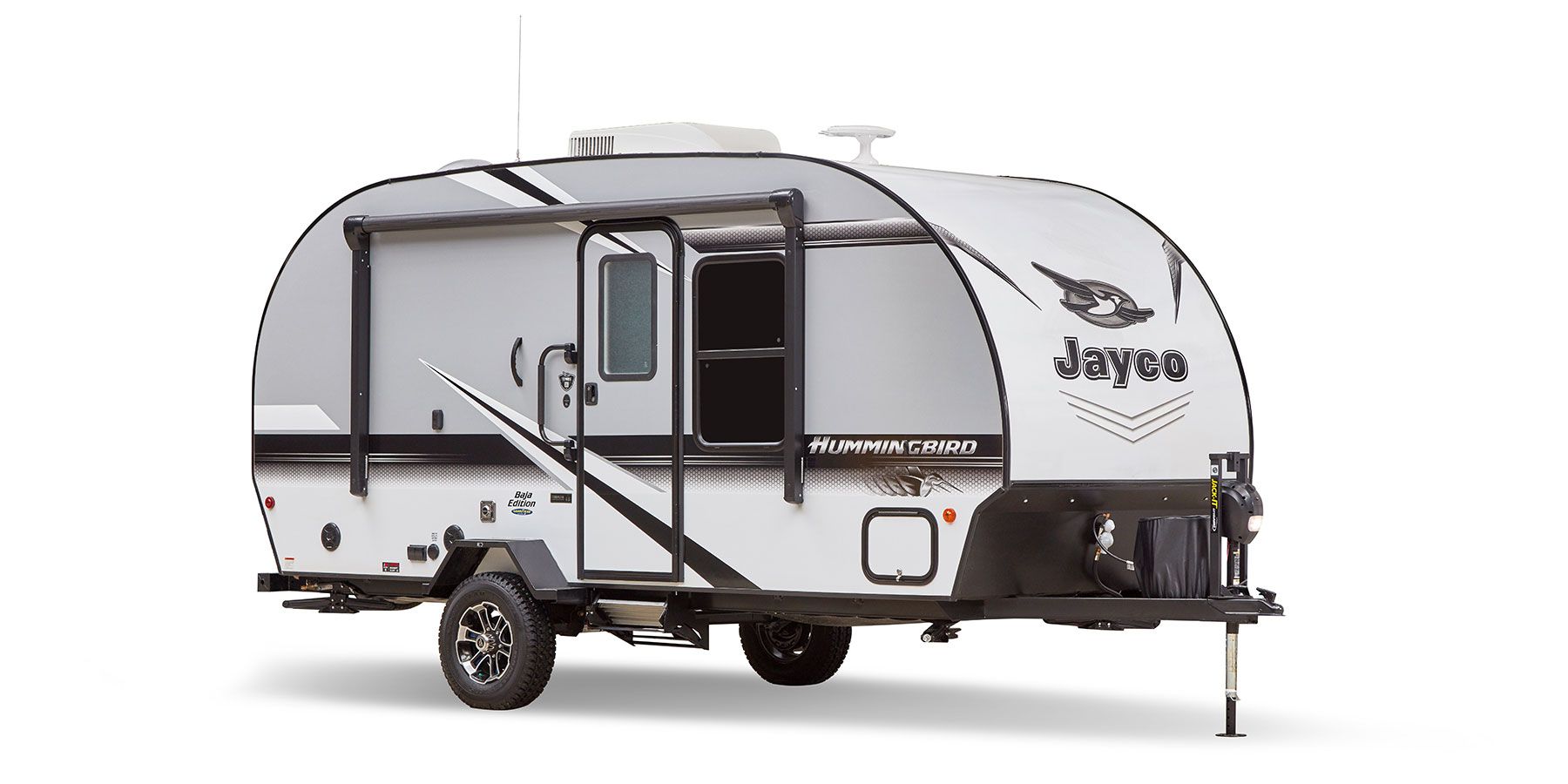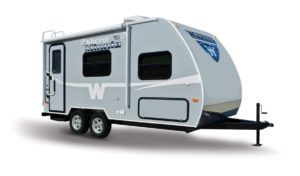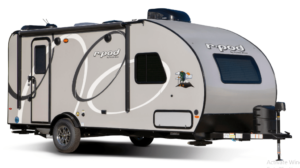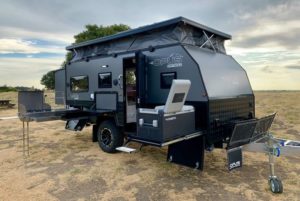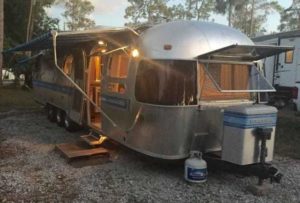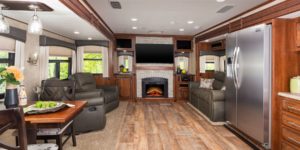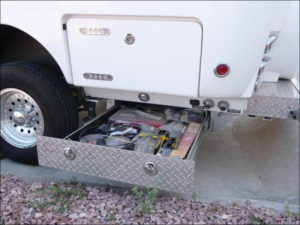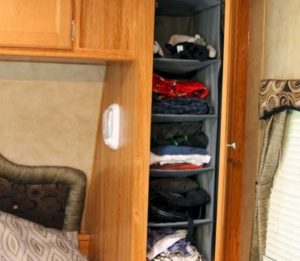TRAILERS
(The Rvs pictured here and else where are samples. These are not specific recommendations as we have not researched them)
This category of Rvs is a really huge one. There are lots of variety when it comes to deciding on a travel trailer. There are some options that we are going to exclude, however, from our discussion.
Fifth Wheels we have decided to put in a category of their own. We are also not going to cover popup trailers, those that have a physical body but have a canvas structure on top and the smaller “tear drop” shape campers. Both of these trailer options are lacking in what we think are essentials for RV living full time such as showers and usually toilets. No question that some people could live in one of these choices, but I think in most cases these are reserved for a temporary “camping” experience and not full time living.
1. Mobility
- a travel trailer requires a tow vehicle the heftiness of which depends on how heavy and large the trailer is. Usually the range varies from a 6 cylinder SUV to a 1 ton truck.
- if you are planning on going to a location and staying for a while then going through the process of unhitching is perfectly doable. You would then use the tow vehicle to explore.
- If you are planning on traveling frequently from location to location then you will want to remember the hitching and unhitching process and the degree to which you are OK with going through it frequently. Some people take bikes with them on the back of the trailer or in the bed of a truck to use when exploring.
2. Number of People
Most travel trailers can accommodate various numbers and configurations of occupants from the solo traveler to more than one couple/children. Just remember that the more occupants, the larger the trailer and therefore the larger the tow vehicle required. * Layout is really key here. Its the one thing you really can’t change very well after purchase, so it is good idea not to compromise on it
3. Your Physical Condition
Hitching and unhitching a travel trailer of any size does require some physical agility and strength. Most travel trailers come with a motorized jack stand, so you can raise or lower the tongue of the trailer to level of the ball on the hitch of the tow vehicle. This helps, but there is still putting down jacks to stabilize, attaching hitch equalizer bars, if you have them, and other steps.
We recommend that if you have any doubts as to whether you can comfortably hitch and unhitch a new trailer, you should ask the seller to teach you the process and experience it first hand before you buy.
4. Working While Roaming
5. Terrain
Consider what kind of exploring you plan to do before you purchase your new travel trailer home.
if you really love the idea of taking your trailer on the back roads, and live off the grid, the type of trailer you want to consider changes dramatically. You will want to consider ground clearance of the trailer, tire size, black and gray water tank capacity, suspension, storage and perhaps power generating. Likely that you will also want to research the type of tow vehicle also.
If you see yourself mainly highway driving to wonderful but easily accessible destinations, the type of trailer you can consider will expand greatly. RV parks often offer a couple of different types of hook ups to your trailer. A full hook up includes 30 or 50 amp electric service, and sewer connection. A electric only hookup is as it implies and dry camping is without either electricity or sewer. The cost gets cheaper as you move towards no facilities.
6. Budget and Construction
They are:
- Insulation – learn more here Note that no RV has the kind of insulation that a house has, but it is a great idea to begin to have some familiarity with range of R values in trailers. Trying to heat or cool a trailer in extremes of weather can be an impossible task if its not built with enough insulation.
- Heating and cooling – Usually the trailer will have a propane furnace. Note the BTU rating and how much propane the tanks hold. How large is the AC? Is it large enough for the size of the trailer?
- Fixtures – Plumbing(pipes, sinks, faucets, toilets and showers) and wiring are important. Research the quality of the components that went into building the trailer. I know that it seems like we are trying to turn you into an architect , but for full time RV living this kind of basic understanding can make the difference between a burst pipe in the middle of a cold night, or a blown circuit breaker on a hot summer day.
7. Level of Comfort
Many of today’s travel trailers truly bring the comfort of home with you on the road to new adventures. They have TVs, microwave ovens, comfy queen/king beds, hot showers, and many other features that promote that “I really am at home” feeling. In choosing a trailer, it is important for you to decide which of these features are the most important to you. RV living full time implies that you have chosen an RV that really does satisfy your needs for a certain level of comfort.
This is especially true for the size of trailer that you choose. Larger trailers tend have more features; a second tv in the bedroom, a microwave AND convection oven, a separate stall shower and a private bedroom with a real door. Before writing the financial check, do a reality check of your own to make sure you can live in this RV and not feel deprived.
8. Handiness
Now we come to what we mentioned before is a very important consideration necessary for your day to day enjoyment of living full time in your trailer.
Think of a trailer as your home and when it is going down the road, think of it as your home subjected to a constant earthquake. This is really important concept for new RVers to understand and helps explain why RVs require constant tightening, recaulking, repositioning, regluing, rerouting and patience. If you understand this fact of life about your RV, you will feel less discouraged when things need fixing and maintaining.
Any RV, new right off the showroom and “gently used” will require this kind of attention. No RV makers that I am aware of tests its RVs by shaking to simulate going down the road. You can depend on even a new RV, especially a new RV, to have things that will need adjusting and fixing.
A used RV, if taken care of, may actually be less likely to have as many issues.
We would like to suggest that as a new “full timer” you join lots of support groups on Facebook etc. These groups are incredibly supportive and will help you with questions, guidance and tips on how to maintain your new home. Keep coming back here for new and updated information and take advantage of our offer to personally answer your questions.
One of the things implied here is that there are people out there you can pay to do all the maintenance and “fixing” for you and some are very good. BUT this can be expensive, and such resources are not going to be available 24 hrs a day and at your location. Developing some basic understanding of how your Trailer works and some ability to successfully address minor issues will serve you well.
9. Space
Living full time in an RV means that the amount of actual square footage that you will have to move around in, either by yourself or with others is going to be less than any house. That can be a great thing or intolerable one, depending on you. We have had people come over and visit us in our very spacious 40 ft motorhome with 4 slides and ask how can we live like this. Obviously RV living is not for everyone.
Just make sure before you select your dream RV that you have spent some time in it. It may seem wonderful and roomy at first, but imagine how you will feel during a long string of rainy days. Trailers really do vary in this regard and slides really make a world of difference.
Newer trailers often have “opposing” slides, meaning slides on both sides of the living room for example. These two slides can make a huge difference in the actual space in the living room which is the main living area in the RV.
Ceiling height can also add more space and create an enhanced openness. Newer RVs and especially fifth wheel trailers usually have higher ceilings.
We could begin to quote square footage available in a trailer but i am not sure how that would help with this discussion. RV brochures never quote the square footage in their units because it is hard to measure and it really doesn’t help appreciate the actual space available. In a trailer the furniture is built in and assessing the degree to which you feel an openness of the living space is very much a personal experience, one i encourage to explore carefully.
10. Stuff
Closely related to actual living space in a trailer is the built in furniture, discussed above, and the amount of your personal stuff that you want to bring along. Trailers do not have much storage space. Of the three main groups of RVs; trailers, fifth wheels and motorhomes, trailers have the least.
There are a couple of reasons for this. The first of these is simply weight capacity. A trailer is pulled by a hitch on the back of the tow vehicle. There is tongue weight which is the weight pulling down on this hitch by the tongue of the trailer. Then there is the weight that is born by the wheels of the trailer. Most newer trailers are built out of light weight materials so that more fuel efficient vehicles can tow them. As a result of all these factors, the actual weight of stuff, including water and contents of black and gray tanks is limited.
The second reason for the limited storage capacity in a trailer is how they are built. The super structure in a trailer is built on the frame as opposed to a motorhome, for example which as storage bays between the frame and the super structure. In a motorhome this area also houses the engine etc. A trailer, as a result, will have some smallish hatches here and there outside to store some supplies. Inside there likely will be storage under the bed, maybe the couch and in cabinets. But if you are looking to take a lot of “stuff” with you, generally a travel trailer will have the least ability to accommodate you. As always, the larger the trailer the more storage it will have. At the same time a larger trailer increases the heftiness required in the tow vehicle and reduces maneuverability.
Obviously these are all considerations to think about as you choose your new RV.
